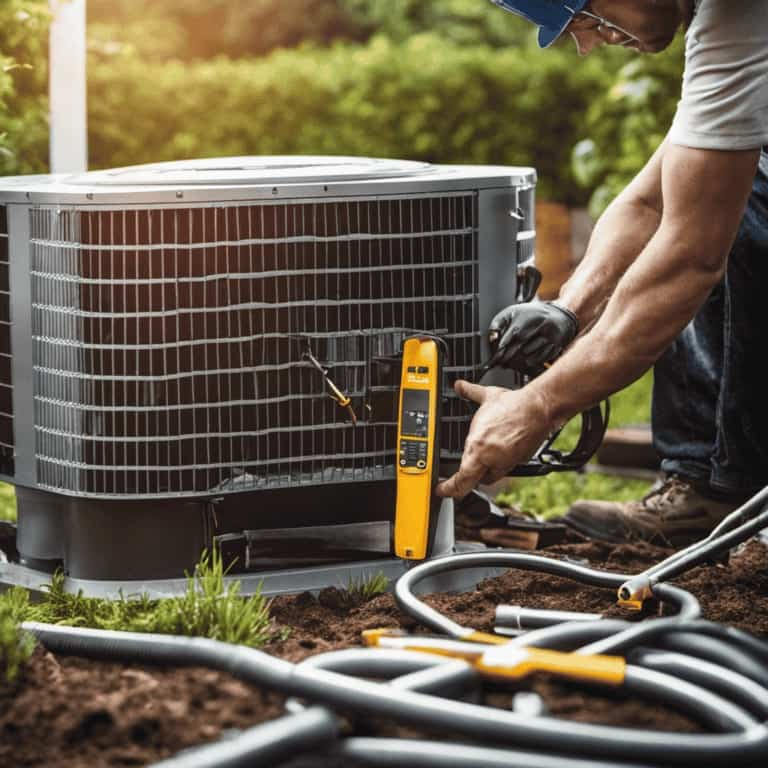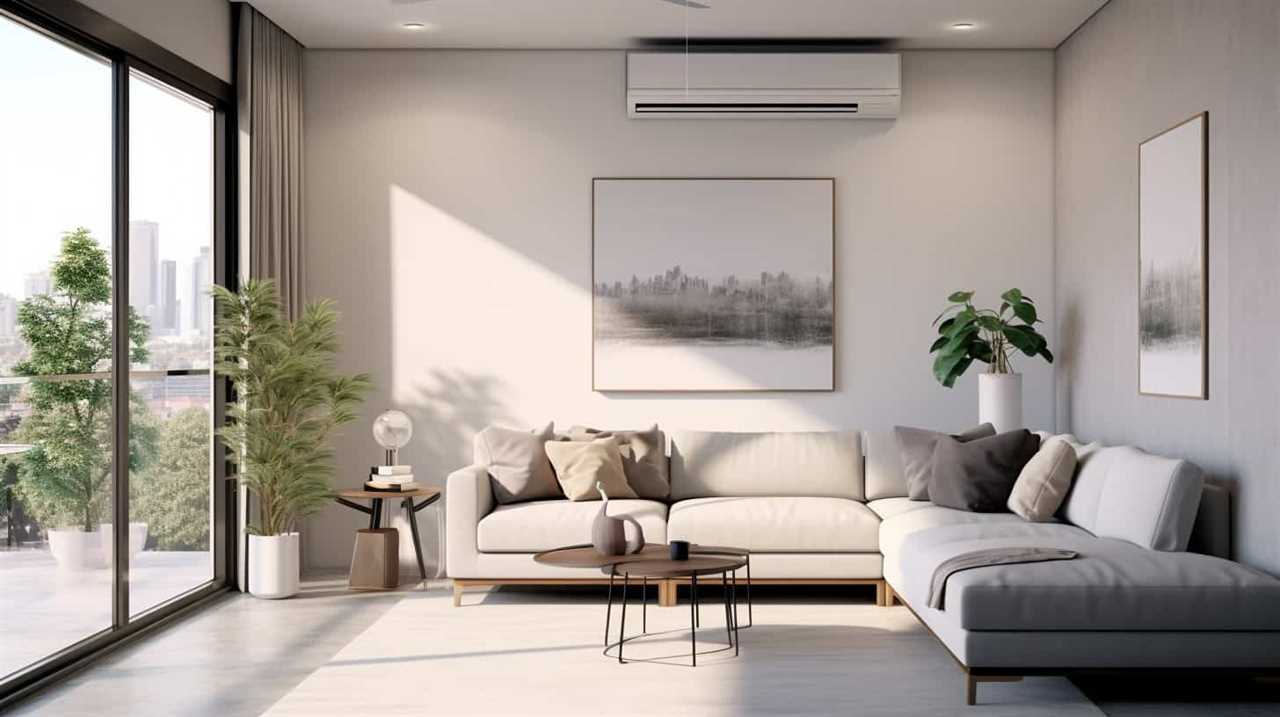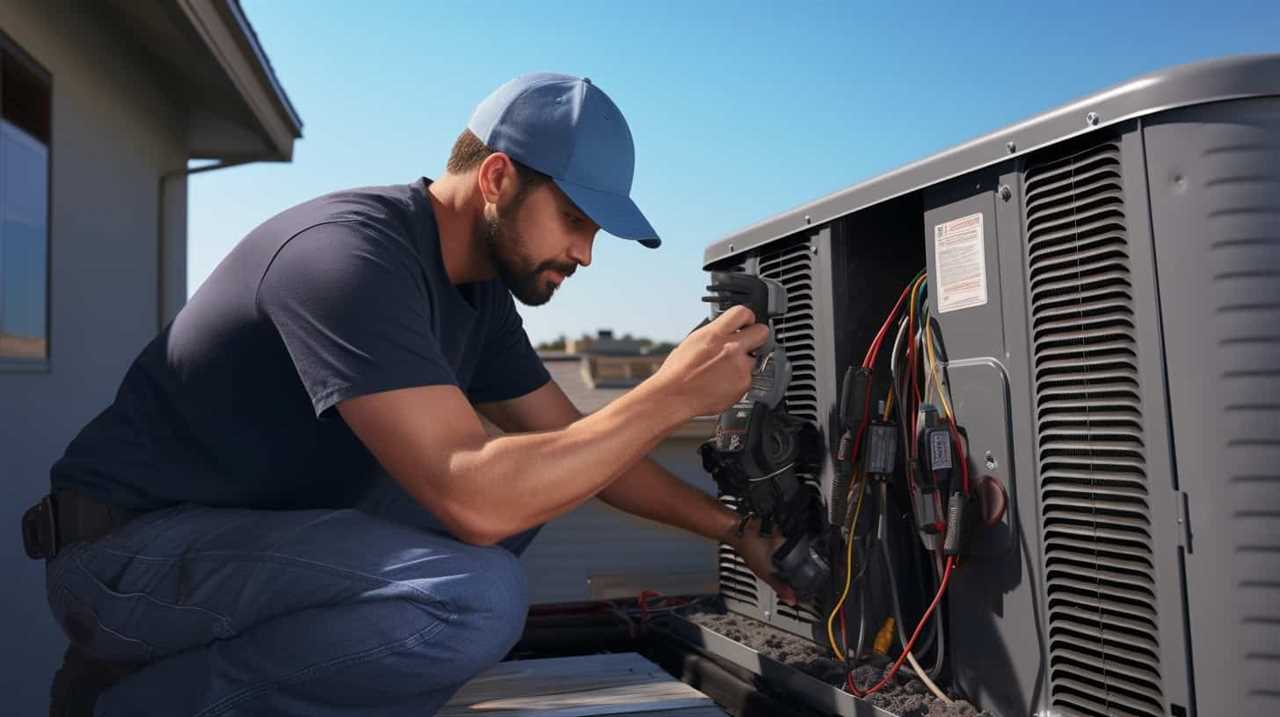Tired of paying high energy bills and dealing with inefficient heating and cooling systems? Look no further! This article will help you improve energy efficiency by using heat pumps.
Imagine reducing your energy consumption by up to 50% while still enjoying a comfortable living space. With our expert tips and techniques, you can achieve optimal performance and save money.
Join us as we explore the world of heat pumps and discover the path to a more efficient and sustainable future.
Key Takeaways
- Heat pumps are highly efficient and can transfer heat effectively.
- Proper sizing, installation, and maintenance of heat pumps are crucial for optimal performance and energy efficiency.
- Smart thermostat technology can enhance energy efficiency by allowing for temperature adjustments based on occupancy and weather.
- Improving insulation, sealing air leaks, and utilizing geothermal heat pumps are effective strategies for enhancing energy efficiency.
Understanding the Basics of Heat Pumps
In this section, we’ll explore the basics of heat pumps and how they can enhance energy efficiency. Understanding heat transfer and efficiency ratings is crucial in comprehending how heat pumps work and their benefits.

Heat pumps are devices that transfer heat from one place to another, providing both heating and cooling functions. They use a refrigerant to absorb heat from the outside air or ground and transfer it indoors, or vice versa, depending on the desired temperature. This transfer of heat is highly efficient, as heat pumps can deliver more energy than they consume.
Efficiency ratings, such as the Seasonal Energy Efficiency Ratio (SEER) and Heating Seasonal Performance Factor (HSPF), measure the effectiveness of heat pumps in converting energy into heating or cooling.
The Importance of Energy Efficiency in Heating and Cooling
Our focus is on understanding the importance of energy efficiency in heating and cooling systems. Energy efficiency plays a crucial role in reducing our carbon footprint and conserving resources.
Here are four reasons why energy efficiency is vital in heating and cooling:

-
Cost savings: Energy efficient appliances consume less energy, resulting in lower utility bills and significant cost savings in the long run.
-
Environmental impact: By reducing energy consumption, energy efficient heating and cooling systems help to lower greenhouse gas emissions, contributing to a healthier environment.
-
Comfort and reliability: Energy efficient systems provide consistent and reliable heating and cooling, ensuring optimal comfort levels in homes and buildings.
-
Longevity: Energy efficient appliances are designed to operate more efficiently, resulting in less wear and tear, longer lifespan, and reduced maintenance costs.

Choosing the Right Size and Type of Heat Pump for Your Space
We need to consider both the size and type of heat pump when choosing the right one for our space. Heat pump sizing is crucial to ensure optimal performance and energy efficiency. A heat pump that is too small may struggle to heat or cool the space effectively, while a heat pump that is too large can lead to excessive energy consumption. To determine the appropriate size, we must consider factors such as the square footage of the area, the insulation level, and the climate. Additionally, there are different types of heat pumps available, including air-source, ground-source, and ductless mini-split systems. Each type has its own advantages and considerations, such as installation requirements and cost. Choosing the right size and type of heat pump is essential for maximizing energy efficiency and comfort in our space.
| Size | Type |
|---|---|
| Small | Air-Source |
| Medium | Ground-Source |
| Large | Ductless Mini-Split |
| Extra-Large | |
Proper Installation Techniques for Maximizing Efficiency
To ensure maximum efficiency, it’s important to properly install heat pumps using the right techniques and materials. Here are some installation best practices for maximizing savings:
-
Location: Install the heat pump in a well-insulated area away from direct sunlight and sources of heat. This will prevent unnecessary heat gain and improve efficiency.
-
Sizing: Ensure that the heat pump is properly sized for your space. Oversized or undersized units can lead to decreased efficiency and increased energy consumption.

-
Ductwork: Seal and insulate the ductwork to minimize air leakage and heat loss. This will improve the overall performance of the system.
-
Refrigerant Charge: Accurately charge the heat pump with the correct amount of refrigerant. An incorrect charge can result in reduced efficiency and potential damage to the unit.
By following these installation best practices, you can maximize savings and ensure optimal performance of your heat pump.
Now, let’s move on to the next section discussing how to maintain and clean your heat pump for optimal performance.

Maintaining and Cleaning Your Heat Pump for Optimal Performance
To ensure optimal performance, regularly maintain and clean your heat pump by following these simple steps. Proper maintenance and cleaning of your heat pump will not only extend its lifespan but also improve its energy efficiency. Here are some troubleshooting tips to help you maintain and clean your heat pump effectively:
| Maintenance Steps | Cleaning Steps | Troubleshooting Tips |
|---|---|---|
| Check air filters | Clean outdoor unit | Inspect ductwork |
| Check refrigerant levels | Clean indoor unit | Check thermostat settings |
| Lubricate moving parts | Clean coils | Check for strange noises |
Regularly checking and cleaning the air filters is essential to keep your heat pump running smoothly. Cleaning the outdoor and indoor units will prevent dirt and debris buildup, ensuring optimal heat transfer. Additionally, inspecting the ductwork and checking for strange noises can help identify any potential issues early on. By following these maintenance and cleaning steps, you can maximize the performance and energy efficiency of your heat pump.
Utilizing Smart Thermostat Technology to Enhance Energy Efficiency
Smart thermostat technology offers numerous benefits in enhancing energy efficiency. By making energy-saving temperature adjustments based on occupancy patterns and weather conditions, smart thermostats can significantly reduce energy consumption.
Additionally, the convenience of remote control allows users to adjust the temperature and monitor energy usage from anywhere, ensuring optimal energy efficiency at all times.

Smart Thermostat Benefits
We can maximize energy efficiency by harnessing the benefits of smart thermostat technology. Smart thermostats offer a range of features that help optimize energy usage and reduce utility costs.
Here are four key benefits of using smart thermostats:
-
Energy saving programming: Smart thermostats allow you to create customized schedules to automatically adjust temperature settings based on your preferences and daily routines. This feature ensures that your heating and cooling systems are only active when needed, resulting in significant energy savings.
-
Remote access and control: With smart thermostats, you can easily monitor and adjust your home’s temperature settings from anywhere using your smartphone or tablet. This flexibility allows you to optimize energy usage even when you’re not at home, ensuring comfort while minimizing wasteful energy consumption.

-
Learning capabilities: Smart thermostats are equipped with advanced algorithms that learn your heating and cooling patterns over time. This learning capability enables them to automatically adjust temperature settings for maximum comfort and energy efficiency.
-
Integration with smart home systems: Smart thermostats can seamlessly integrate with other smart home devices, such as lighting and occupancy sensors. By coordinating the operation of these systems, you can achieve even greater energy savings and convenience.
Energy-Saving Temperature Adjustments
By making energy-saving temperature adjustments with the help of smart thermostat technology, we can enhance our overall energy efficiency. Smart thermostats offer advanced features that allow for precise control of heating and cooling systems, resulting in significant energy savings.
One of the key features is energy-saving programming, which allows users to schedule temperature adjustments based on their daily routines. This programming feature ensures that the heating or cooling system operates at optimal levels only when necessary, reducing energy wastage during unoccupied periods.

Additionally, smart thermostats provide smart temperature control, enabling users to remotely monitor and adjust the temperature settings via smartphone apps. This feature allows for real-time adjustments based on weather conditions, personal preferences, and occupancy status, further maximizing energy efficiency.
Incorporating energy-saving temperature adjustments through smart thermostat technology is an effective way to reduce energy consumption and lower utility costs while maintaining comfort levels in our homes or offices.
Remote Control Convenience
Controlling our thermostat remotely allows us to conveniently enhance energy efficiency using smart thermostat technology. With the remote control features and wireless connectivity of smart thermostats, we can optimize our energy usage and reduce waste.
Here are four ways remote control convenience can enhance energy efficiency:

-
Adjust temperature settings from anywhere: Whether we’re at work, running errands, or on vacation, we can easily access our thermostat through a smartphone app. This allows us to adjust the temperature to save energy when we’re not at home.
-
Create customized schedules: Smart thermostats offer the flexibility to create personalized schedules based on our daily routines. We can set different temperature preferences for different times of the day, ensuring that our home is always comfortable while minimizing energy consumption.
-
Monitor and analyze energy usage: Smart thermostats provide detailed insights into our energy consumption patterns. We can track our usage over time, identify areas of improvement, and make informed decisions to optimize efficiency.
-
Integration with other smart devices: Smart thermostats can be integrated with other smart devices in our home, such as motion sensors and occupancy detectors. This allows for automated adjustments based on occupancy, ensuring that energy is only used when needed.

Improving Insulation and Sealing to Minimize Energy Loss
To effectively minimize energy loss, it’s important to regularly inspect and improve insulation and sealing. Proper insulation techniques and energy-saving measures play a crucial role in enhancing energy efficiency using heat pumps.
Insulation helps to create a thermal barrier, preventing the transfer of heat between the inside and outside of a building. By using materials with high insulation properties, such as fiberglass or foam, we can reduce heat loss and keep the desired indoor temperature stable.
Additionally, sealing any air leaks around windows, doors, and vents is essential to prevent drafts and maintain optimal energy efficiency.
Regularly inspecting and addressing insulation and sealing issues can significantly reduce energy consumption and lower utility bills, while also improving comfort levels for occupants.

Harnessing Renewable Energy Sources to Power Your Heat Pump
With the right equipment and proper installation, we can effectively harness renewable energy sources, such as solar or geothermal power, to efficiently power our heat pumps. By utilizing these sustainable energy sources, we not only reduce our reliance on non-renewable resources but also save on energy costs.
Here are four ways to harness renewable energy sources for your heat pump:
-
Solar Power: Install solar panels on your property to convert sunlight into electricity. This clean and abundant energy source can power your heat pump and even generate excess energy that can be sold back to the grid.
-
Geothermal Heat Pumps: Tap into the earth’s natural heat by installing a geothermal heat pump system. These systems use the constant temperature below the Earth’s surface to efficiently heat and cool your home, reducing energy consumption and greenhouse gas emissions.

-
Renewable Energy Incentives: Take advantage of government incentives and rebates available for installing renewable energy systems. These financial incentives can help offset the initial cost of installing solar panels or geothermal heat pump systems.
-
Hybrid Systems: Combine renewable energy sources with traditional electricity to create a hybrid system. This allows for flexibility and ensures a continuous supply of energy, even during periods of low renewable energy production.
Exploring Geothermal Heat Pump Systems for Greater Efficiency
When exploring ways to enhance energy efficiency using heat pumps, we can achieve greater efficiency by exploring geothermal heat pump systems.
Geothermal heat pump technology utilizes the constant temperature of the earth to provide heating and cooling for homes and buildings. These systems work by transferring heat between the ground and the building using a network of pipes buried underground.

The benefits of geothermal heat pumps are numerous. They have higher efficiency ratings compared to traditional heat pumps, resulting in lower energy consumption and reduced utility bills. Geothermal heat pumps also have a longer lifespan and require less maintenance, leading to cost savings in the long run. Additionally, they produce fewer greenhouse gas emissions, making them an environmentally friendly choice.
Tips for Efficiently Operating Your Heat Pump in Different Seasons
We can optimize the performance of our heat pump in various seasons by following these tips:
-
Regular Maintenance: Schedule professional maintenance at least once a year to ensure that your heat pump is working efficiently. This includes cleaning or replacing filters, checking refrigerant levels, and inspecting the electrical connections.
-
Adjust Thermostat Settings: Set your thermostat to the most energy-efficient temperature for each season. For cooling, keep it at around 78°F (25.5°C) and for heating, aim for 68°F (20°C).

-
Utilize Programmable Thermostats: Install a programmable thermostat to automatically adjust the temperature settings based on your daily routine. This can help save energy by reducing the workload on your heat pump when you’re away.
-
Take Advantage of Natural Ventilation: Open windows and use ceiling fans to circulate cool air during the summer. In the winter, close curtains at night to retain heat and open them during the day to let sunlight in.
Monitoring and Analyzing Energy Usage to Identify Areas for Improvement
To maximize energy efficiency using heat pumps, it’s crucial to monitor and analyze energy usage in order to identify areas for improvement.
By conducting a thorough analysis of energy consumption patterns and data, we can pinpoint specific areas where energy is being wasted or used inefficiently.

This information enables us to make informed decisions and implement targeted strategies to enhance energy efficiency and reduce energy consumption.
Energy Usage Analysis
We regularly monitor and analyze our energy usage to identify areas for improvement. By conducting energy usage analysis, we can pinpoint specific ways to enhance energy efficiency and reduce our environmental impact.
Here are four key areas we focus on:
-
Assessing appliance efficiency: We evaluate the energy consumption of our appliances and consider replacing outdated models with energy-saving alternatives. Energy-saving appliances can significantly reduce electricity usage and lower our utility bills.

-
Reducing standby power: Standby power, also known as vampire power, is the energy consumed by devices when they aren’t in use but still plugged in. We identify devices that consume excessive standby power and implement solutions such as smart power strips or unplugging devices when not in use.
-
Monitoring peak demand: We analyze our energy usage during peak demand periods and explore strategies to reduce our consumption during these times. This can include adjusting our usage patterns or implementing demand response programs.
-
Implementing energy management systems: We leverage advanced technology to track and manage our energy usage. Energy management systems provide real-time data, allowing us to identify areas of inefficiency and make informed decisions to optimize our energy consumption.
Identify Improvement Areas
By regularly monitoring and analyzing our energy usage, we can identify areas for improvement. One key area to focus on is improving ductwork efficiency. Ductwork is responsible for distributing heated or cooled air throughout a building, so any leaks or obstructions can lead to energy waste.

Conducting regular inspections to identify and seal any leaks in the ductwork can significantly improve energy efficiency. Additionally, optimizing airflow within the ductwork system is crucial. Properly designed and balanced airflow ensures that conditioned air reaches all areas of the building, reducing the need for excessive heating or cooling.
This can be achieved by adjusting dampers, cleaning air filters regularly, and ensuring that the system is properly sized for the building’s needs. By addressing these improvement areas, we can maximize energy efficiency and reduce energy consumption.
Frequently Asked Questions
Can I Use a Heat Pump in Any Type of Climate?
Yes, heat pumps can be used in any type of climate. They are designed to work efficiently in extreme climates and can provide heating and cooling in different weather conditions, making them a versatile and energy-efficient choice.
How Often Should I Clean and Maintain My Heat Pump?
Maintaining and cleaning heat pumps is crucial. We must be aware of the frequency required for heat pump maintenance. Signs of damage, such as strange noises or reduced performance, should prompt immediate action.

What Are the Benefits of Utilizing Smart Thermostat Technology With a Heat Pump?
Utilizing smart thermostat technology with a heat pump brings numerous benefits. Compatibility with smart thermostats allows for precise temperature control and scheduling, resulting in significant energy savings and increased overall efficiency.
Are There Any Government Incentives or Rebates Available for Installing a Heat Pump?
There are various government incentives available for installing heat pumps, which can greatly contribute to energy savings. These incentives aim to encourage individuals to adopt more efficient heating and cooling systems for their homes.
How Much Energy Can I Expect to Save by Using a Heat Pump Compared to Traditional Heating and Cooling Systems?
Energy savings comparison between heat pumps and traditional heating/cooling systems is crucial. Long term cost analysis reveals substantial energy savings. Let us help you understand the potential energy savings and make an informed decision.
Conclusion
In conclusion, heat pumps offer an efficient solution for heating and cooling spaces. By understanding the basics, choosing the right size and type, proper installation, and regular maintenance, we can maximize energy efficiency.

It’s like having a well-oiled machine that constantly works to keep our space comfortable, just as a finely tuned engine powers a car smoothly down the road.
By harnessing renewable energy sources and considering geothermal systems, we can further enhance efficiency and reduce our environmental impact.









